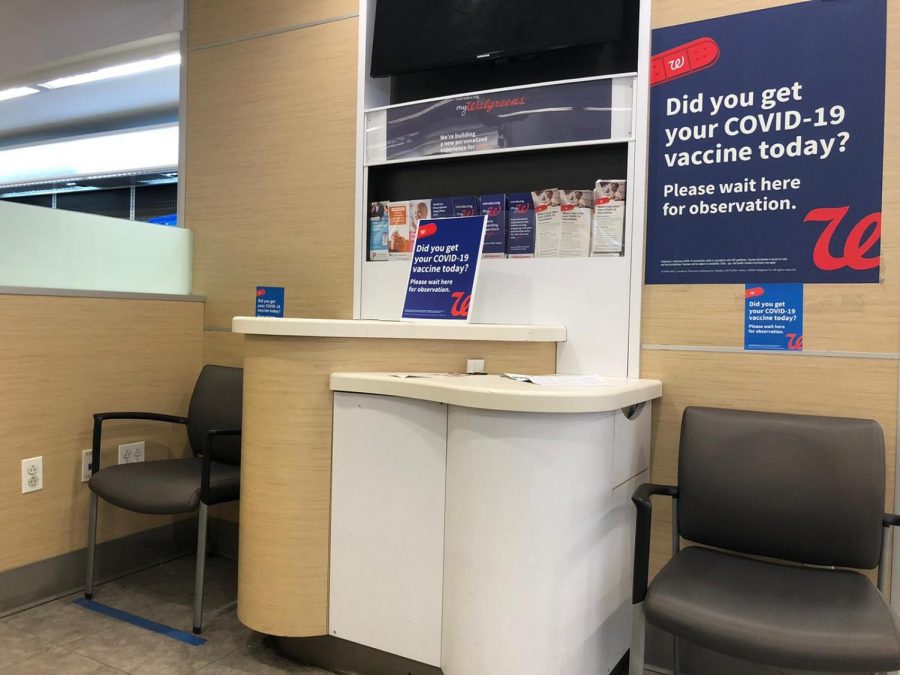Even after vaccination, some students’ concerns about COVID-19 remain
As vaccination rates throughout the state continue to increase, some students feel unsure about the safety of the city and resuming their pre-pandemic activities.
All adults in the US are now eligible for the COVID-19 vaccine, and in some states, all residents 16 and older are eligible for the vaccine. However, even as vaccination rates continue to increase, some students feel unsure about the safety of returning to pre-pandemic activities. (Staff Photo by Roshni Raj)
May 4, 2021
Over a year after the World Health Organization declared COVID-19 a pandemic, the end to the nightmare seems near. April 19 marked the day adults 18 and older in the United States became eligible for the vaccine, though many states — including New York — had already extended eligibility to residents as young as 16.
Many NYU students, both in and out of New York state, have already started getting vaccinated. Yet even with widespread distribution and efficacy rates ranging from 72% to 95%, some students remain worried about their risk of infection.
CAS first-year Lamisa Khan received her second dose of the Moderna vaccine a few weeks ago. She had hoped that the vaccine would offer a sense of security, but found herself feeling just as anxious as she was prior to vaccination.
“There’s the fact that I know that there’s other strains out there, and now there’s talk that we might need a booster shot,” Khan said. “It’s good that I have [the vaccine], it just doesn’t ease my mind on it.”
New strains of the virus have been found in India, Brazil, South Africa and the United Kingdom. Though recent research has shown that the current vaccine remains effective against new strains, their higher transmissibility rate serves as a point of concern among some students.
Because of the new strains, Khan said she will continue to act cautiously by wearing masks and avoiding large gatherings. She is not alone in her worry about safety amid a widespread vaccination campaign.
“I’m still doing the personal things like trying to restrict travel, unnecessary activities and double masking,” CAS first-year Paul Ramnauth said. “I still know that, even with the vaccine, you’re susceptible to disease. It’s just a matter of hospitalization reduction and things like that.”
Ramnauth has only recently received his first dose of Pfizer, but he believes that his mindset won’t change too drastically after receiving the second dose. He’ll feel slightly more comfortable meeting up with friends and going between campus and his home in Queens.
While Ramnauth and Khan share similar concerns about the transmission of the virus even after being vaccinated, others view it as a gateway to their post-pandemic life.
Steinhardt sophomore Alyssa Goldberg has been fully vaccinated since February. While she continues to abide by CDC guidelines for the safety of those around her, she has grown increasingly comfortable with partaking in activities she would have avoided last fall — including going to the gym and flying to visit family.
“I believe in the vaccine,” Goldberg said. “I know that science works, so I’m not going to live in fear … You can’t make yourself be more anxious than you need to be.”
For Khan and Ramnauth, however, adjusting to a world in which they will no longer have to worry about contracting COVID-19 will be difficult — even after everyone has been fully vaccinated.
“I’ve gotten very used to the masks … and I feel like that will stay for a little while,” Khan said. “[I’ll also] have a lot of cleaning stuff on me, which was always good before but now you need it — like always having hand sanitizer [and] always having wipes.”
The lingering fear could be due to the traumatic experiences associated with COVID-19. Being thrown into an entirely new way of life was no easy feat. To expect people to suddenly revert to their pre-pandemic lives after almost 15 months of cautious existence is unreasonable, especially for students trying to navigate the challenges brought on by the pandemic.
After having been exposed to the virus in the past, Ramnauth will be more mindful about knowing where the people he spends his time with have been and what they have been doing. Apart from this fear, he is excited for what the future might hold.
“If we ever experience that kind of limited return to normalcy, [I’m most excited to] travel,” Ramnauth said. “I had a few things I had to do prior to the pandemic in terms of travel, and when I travel I get to see family … [There’s] that weird freedom we get from [being able to] choose all the options.”
The university recently announced vaccination requirements for all students in the fall, but that doesn’t necessarily mean the school will go back to normal. The mode of instruction is still uncertain. Vaccinations might not offer the peace of mind many thought it would, but they are a major step in slowing the spread of the virus and keeping our community safe.
“When everybody gets vaccinated, you protect people,” Khan said. “I think that would give me some peace of mind, especially for friends of mine that wouldn’t be able to get vaccinated due to being immunocompromised.”
Goldberg herself is excited for New York City to return to its former glory, so that she can resume life as it was before COVID-19 took her New York experience away.
“Honestly, a big reason [I came to NYU] in the first place was because I grew up near New York City, and I love the New York City music scene,” said Goldberg, who just recently bought tickets for a show scheduled in October. “That’s honestly what I have missed the most during COVID. So I’m very excited for concerts and festivals and live music.”
Email Natalie Melendez at [email protected].


























































































































































